This Month’s Featured Article
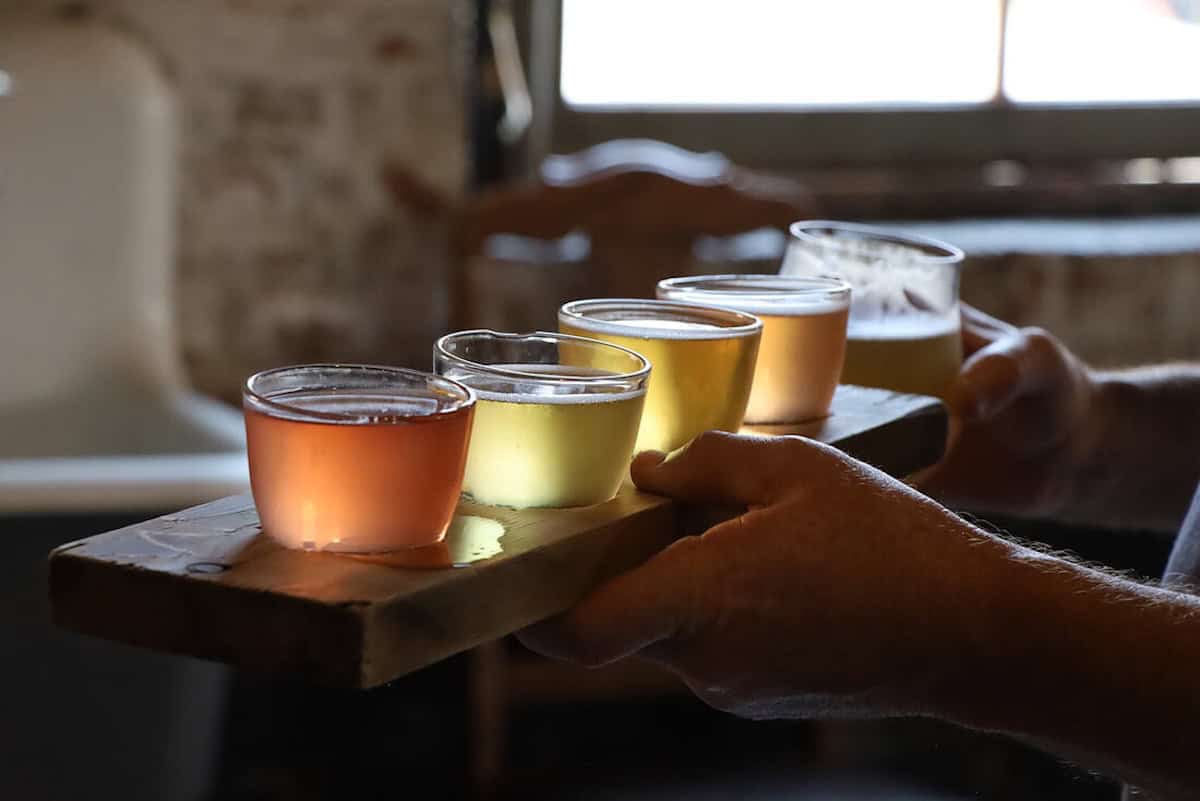
From tree to press: The local orchards producing delicious ciders and wines from their estate-grown apples
If you’re an apple lover like me, then you know that there are few things better in this world than a nice, fresh hard cider. Autumn has always been my favorite season for many reasons – and apple picking is certainly one of them! We are lucky to live in a region that is bountiful with apple orchards and farms. Many of these farms also have on-site cideries where they use their estate-grown apples to ferment ciders, wines, and other delicious beverages. Next time you find yourself planning an apple-picking excursion, don’t miss out on stopping into the cideries at one of the orchards that I’ve rounded up below.
Hilltop Orchards and JMASH Ciderhouse
508 Canaan Road/Route 295, Richmond, MA. hilltoporchards.com.
Hilltop Orchards, located in Richmond, MA, is nestled at the foothills of the Berkshires and on the border of upstate New York. The orchard, which is over 100 years old, is a 187-acre working farm with an orchard-to-can cidery, winery, and tasting room. They grow over 27 different varieties of apples, including heritage and heirloom apples, and the on-site cidery is one of the oldest continually operating cideries in New England.
“We’re proud to sustainably grow our many apple varieties and other fruits at the orchard. Some of our apples are heirloom apples with century-old trees that date back to the start of the orchard. We turn them into amazing apple and fruit products with complete quality control on-site,” Hilltop Orchards writes on its website.
The Vittori family operates Hilltop Orchards under three guiding principles, “creating warm memories for groups of friends and families with an immersive orchard experience, producing artisanal ciders and wines that authentically represent the fruit, and operating using the principles of sustainable agriculture that will enable our orchard to last for generations.”
JMASH, Hilltop Orchards’ cider line, is a blend of cider that perfectly walks the line between sweet and dry. Hilltop Orchards cold-presses its apples using the traditional rack and cloth method – a process of pressing fruit to separate juice from the pulp by layering crushed fruit between racks and cloths and applying pressure to extract the juice. From there, the fermentation process begins. JMASH ciders are also made with pinpoint carbonation, which is a carbonation process that produces a smoother, smaller, and more balanced bubble for an “airy effervescence,” and aged in oak barrels, which improves the taste and quality of the cider, adding depth and nuance to the flavor.
Hilltop Orchards currently has four ciders listed on their site. Johnny Mash Original American Cider is made with estate-grown McIntosh and Northern Spy apples and slowly aged in American Oak, which creates a semi-sweet, lightly toasted oak finish. The Farmhouse Hazy Cider is made with a variety of estate-grown heritage apples fermented in the traditional Herefordshire manner to produce a dry, crisp cider. The Coconut Lime Cider is made with creamy coconut and bright lime flavors, and will transport you to a tropical location with the first sip. The French Cidré is made with Golden Russet apples and fermented with the apple skins on before being slowly aged in French oak, producing a rich and bittersweet cider with characteristics of overripe apples and a dry finish.
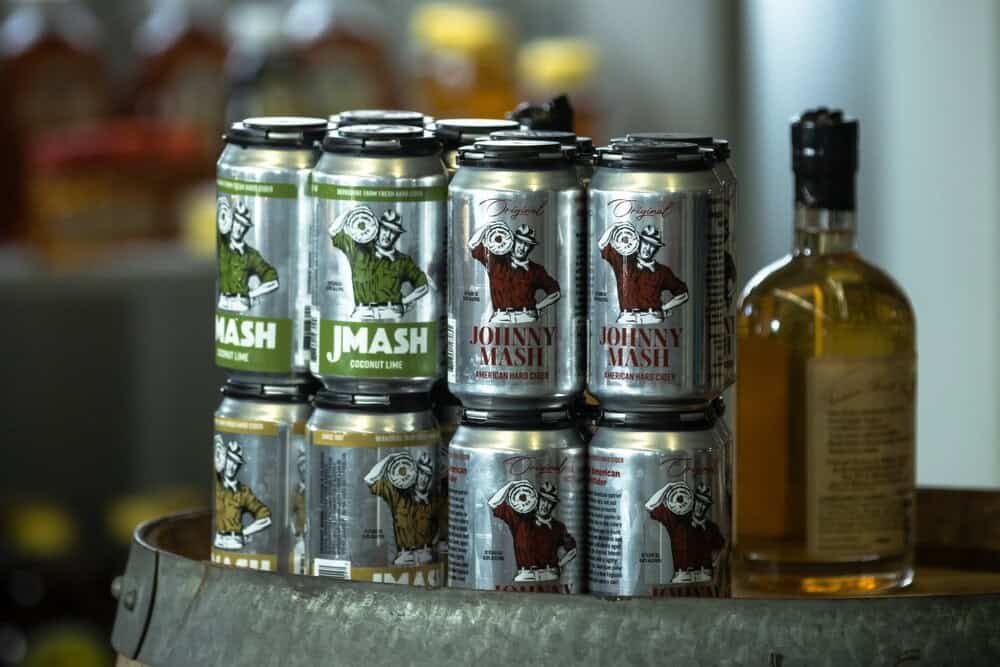
Left Bank Ciders
150 Water Street, Catskill, NY. leftbankciders.com.
Owners Tim and Anna started Left Bank Ciders after working for the compost program at their neighborhood farmer’s market. “Every Saturday morning, one of the big orchards would borrow a compost bin to fill with bruised, banged, and other ‘bad apples’ that they couldn’t sell. Most looked just fine, and after doing all we could think of with these apples, week after week, we eventually decided to try our hand at hard cider,” they write on the Left Bank Ciders website.
“Using a food processor and old pillowcases to grind and squeeze all we could from our formidable bushel of apples, we were left with about two gallons of juice, which we fermented, aged, and bottled. It tasted great, so we kept at it, gathering castoff apples on Saturday, grinding and pressing on Sunday.”
Left Bank Ciders produces “inventive, small-batch ciders that celebrate apples and their environment.” Left Bank forages their own apples from wild and abandoned trees, as well as partners with local orchards to make the best hard ciders. Because Tim and Anna’s roots are in compost, they aim to work towards simplicity and utilize regenerative practices whenever possible. While they do plan to operate their own orchard someday, for now, it’s important that they help their local orchards thrive.
Left Bank Ciders are made with a combination of propagated orchard varieties blended with wild seedling apples that they pick themselves. Orchard apples offer a balanced structure – providing necessary pH levels and alcohol content to make a good-stable cider – while wild apples bring depth and complexity through a sometimes unpredictable mix of bitterness, acids, and tannins (naturally occurring compounds in apples that provide a dry, astringent sensation on the tongue). Left Bank Ciders tend to be complex and on the dry side, but they like to think that they make something for everyone.
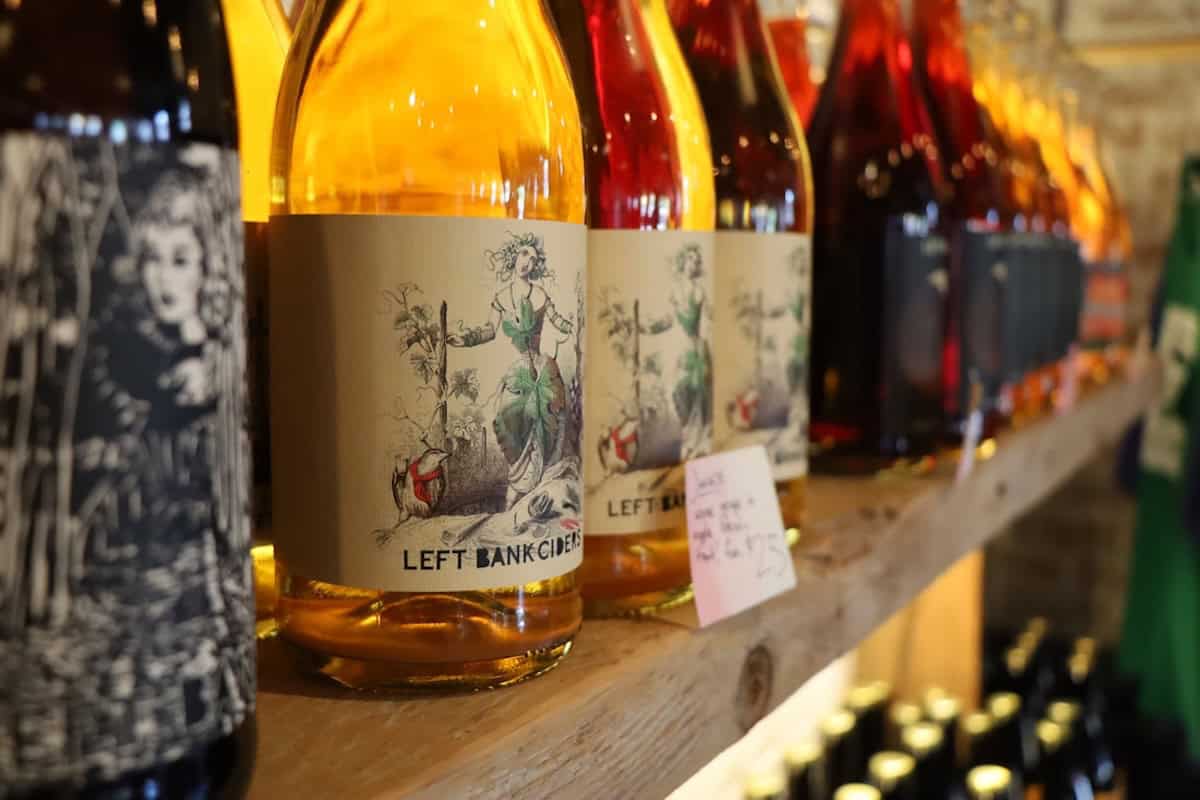
Little Apple Cidery
178 Orchard Lane, Hillsdale, NY. littleapplecidery.com.
Little Apple Cidery was started more than 40 years ago by founders Ron Bixby and Alanne Baerson. Throughout the years of restoring the orchard, Ron and Alanne discovered that the Northern Spy, Golden Russet, and Baldwin apples created a delicious cider. The vision to build a cidery was realized in 2015, and the rest is history!
The cider-making process is seasonal. Little Apple Cidery presses all of the apples during the harvest season, which runs roughly from September to November. Some of the pressed apples become part of Little Apple’s 100% organic fresh cider to drink right away, but the majority of the juice is fermented to become cider.
Little Apple stores their fermented dry cider in bulk and packages small batch blends throughout the year as needed. While Little Apple does occasionally experiment with wild ferments (when naturally occurring yeasts do the job of fermentation rather than controlling the process), their ciders are typically fermented with intentional cultures. Little Apple’s go-to yeasts are neutral strains that allow for maximum fruit expression and consistent flavor profiles.
“We ferment low and slow, at the bottom of a yeast’s given temperature range, to retain desirable aromatics and allow for complex flavors to develop,” explained Hayley Shine, an experienced brewer and cider maker from Chicago who joined the Little Apple team in 2019.
Primary fermentation typically occurs within a matter of weeks, and maturation takes place over months and sometimes years, depending on the cider. Hayley and her team conduct regular evaluation of the base ciders, blending them to achieve the target flavor profiles. “Our ‘little batch’ series is where we try out single varietal ciders or special blends, experimenting with product and process.”
Hayley notes that Hillsdale is in the heart of “one of the world’s premier apple-growing regions.” One of Little Apple’s favorite parts of their work is being able to share their ciders with the community. These days, they are proud to be part of their close-knit community by participating in the Copake-Hillsdale Farmers Market, events at local libraries, and Roe Jan Summerfest and serving their cider on tap at the Roe Jan Brewery, also located in Hillsdale, NY.
“We can’t think of a more enjoyable and rewarding occupation than to plant and grow apple trees, unless it’s making cider from the fruit of those trees,” Hayley jokes. “We do both here at Little Apple Farm and Cidery because it’s all about the apples. Our ciders are dry or semi-dry and made to celebrate the apple – so more like an apple wine, not sweet or blended with lots of other flavors.”
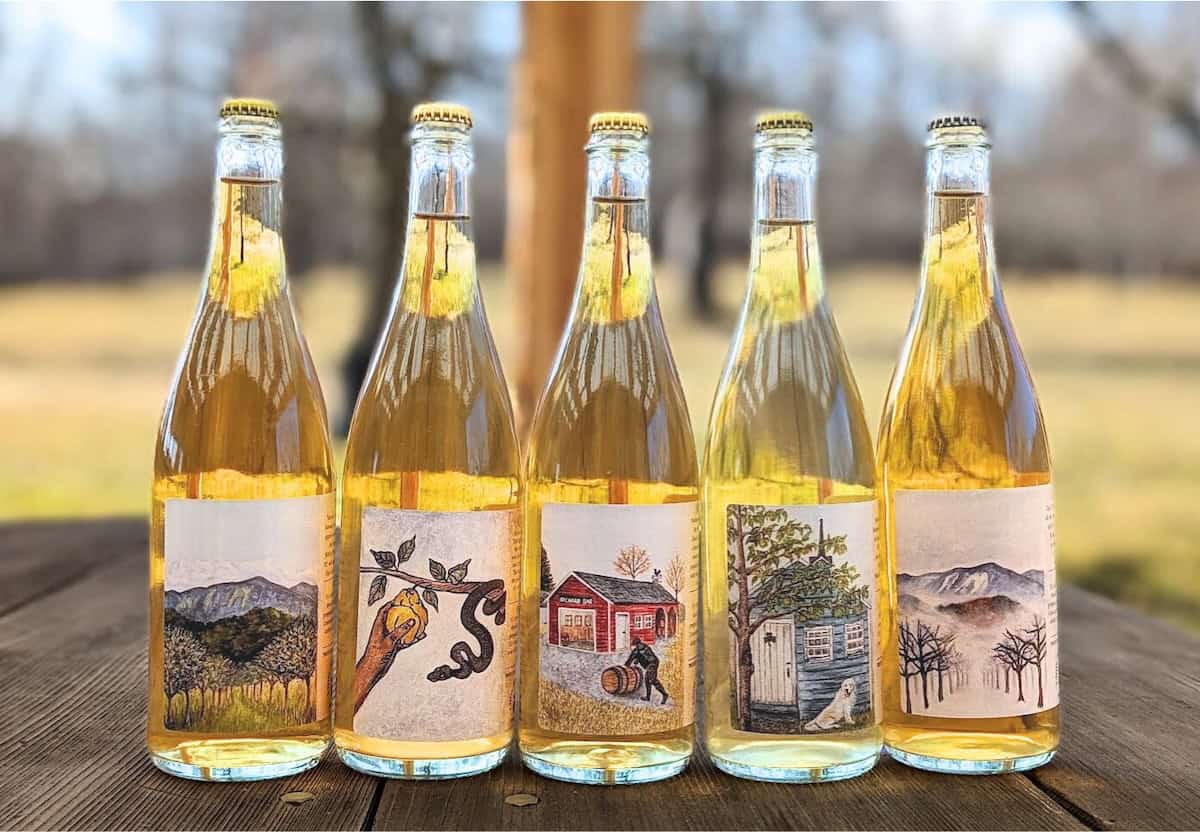
Rose Hill Ferments
19 Rose Hill Farm, Red Hook, NY. rosehillferments.com.
Rose Hill Ferments is located at Rose Hill Farm (a historic orchard founded in 1798) in Red Hook, NY. Since 2018, Rose Hill Ferments has worked hand-in-hand with the farm to produce low-intervention wines, ciders, and co-ferments from primarily Rose Hill Farm grown fruit.
Low-intervention wines and ciders are produced with minimal interference in the process, which allows the natural characteristics of the fruit to shine through and is characterized by minimal additives, limited or no fining/filtering, and natural fermentation.
Rose Hill Ferments selects premium quality, whole fruit and facilitates fermentation without additives. Their low-intervention approach allows the fruits to express both themselves and the Hudson Valley terrier. Rose Hill Ferments does not add harsh chemicals such as malic or tartaric acids, or fining agents, and they also do not use the industrially common processes of filtering, pasteurizing, back-sweetening, or force carbonating. The processes of grinding, foot-stomping, pressing, and bottling are all done on a small scale with attention to detail.
Prior to crushing, grapes and other fruits are fermented in a carbon dioxide-rich environment which causes fermentation from the inside out due to the oxygen-free conditions. The carbon dioxide breaks down the sugars and malic acid within the fruit to produce alcohol, which contributes to the wine and cider’s final flavors.
“We strive for zero waste and utilize our apples, plums, peaches, cherries, blueberries, and apricots for fermentation,” Rose Hill Ferments write on their website.
You might notice when you purchase a wine or cider from Rose Hill Ferments that you see some sediment in the bottom of the bottle or at the bottom of your glass. This is because Rose Hill Ferments does not filter most of their ciders or wines, which ensures that all of the flavor and textures stay in the bottle. If that’s not your style, they do remove the sediment from some of their wines and ciders, including their premium cider, Selection Suspendue; their champagne-style cider, Quincunx; and some of their grape wines.
If you’re not sure where to start, Rose Hill Ferments has a great guide to their products. If you’re interested in apple cider, they recommend first trying the Kitchen Sink, their flagship product made with all Rose Hill Farm fruit. “Expect bright notes of lively citrus and a tropical finish,” they say. A great introduction to their line of co-fermentations (the practice of fermenting two or more fruits at the same time when producing a wine or cider), is the Pearly Dewdrops. As far as wine goes, Rose Hill Ferments recommends starting with Bird Bath, their sparkling rosé. This beverage is a blend of Traminette, Valvin Muscat, and Cab Franc grape varieties and “produces a beautiful floral aroma and herbaceous palette.” •
For more information about any of the above cideries, head over to their official websites.
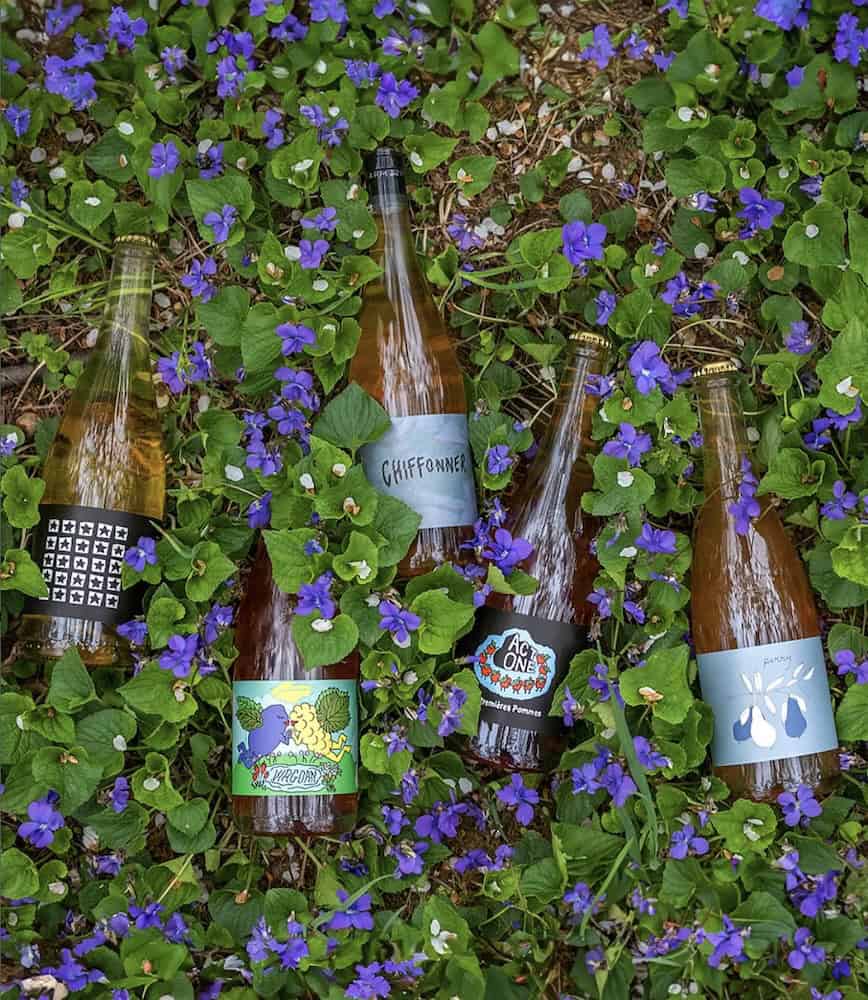
Screenshot


